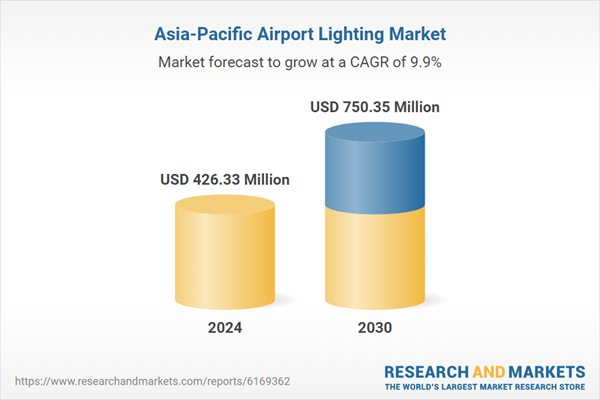Speak directly to the analyst to clarify any post sales queries you may have.
10% Free customizationThis report comes with 10% free customization, enabling you to add data that meets your specific business needs.
Market Drivers
Increasing Air Travel
The growing volume of passengers and flights worldwide is creating a direct need for advanced airport infrastructure, with lighting systems playing a central role in ensuring safe operations. Rising air travel leads to a surge in flight take-offs, landings, and night operations, which requires airports to invest in advanced runway and taxiway lighting that supports high-traffic conditions.Modern lighting enhances navigation accuracy for pilots, reduces the chances of accidents, and improves ground movement efficiency, even under poor weather or low-visibility situations. As airports continue to scale capacity, lighting upgrades are becoming critical in maintaining smooth operations without delays. With higher aircraft movement, precision lighting solutions such as LED-based runway edge lights, approach lighting, and apron illumination are being deployed to ensure uninterrupted operations. For instance, Indian airlines experienced a 12% year-on-year growth in domestic passenger traffic in November, with approximately 12.8 million passengers flying compared to 11.4 million in the same period last year, according to the Directorate General of Civil Aviation (DGCA).
Key Market Challenges
High Installation and Maintenance Costs
Airport lighting systems require substantial investment in terms of installation, infrastructure modification, and long-term maintenance. Advanced lighting technologies such as LEDs and smart adaptive systems, while offering efficiency and performance, involve higher upfront capital expenditure compared to traditional lighting solutions. This can pose challenges for airports with constrained budgets, particularly when lighting upgrades must be coordinated alongside larger modernization projects like runway expansions or terminal upgrades. Maintenance is another cost-intensive aspect, as lighting systems must function continuously and comply with aviation safety regulations, necessitating frequent inspections and timely replacements. Retrofitting existing airports with energy-efficient solutions further raises complexity, as it demands re-engineering of electrical systems and integration with existing airfield management systems.Key Market Trends
Integration of Smart Lighting Systems
Airports are increasingly adopting smart lighting systems that incorporate automation, sensors, and remote-control technologies to improve operational efficiency and reduce energy consumption. Smart systems allow dynamic adjustment of light intensity based on weather conditions, time of day, or runway usage, ensuring optimal performance while conserving energy. Real-time monitoring through IoT-enabled platforms enhances maintenance efficiency by detecting faults and predicting failures before they disrupt operations. Such systems also support centralized control, enabling airports to streamline lighting operations across runways, taxiways, and aprons with improved coordination. By integrating with air traffic management systems, smart lighting can contribute to smoother aircraft ground movements, reducing delays and enhancing safety.Key Market Players
- Astronics Corporation
- Aveo Engineering Group, s.r.o.
- Cobham Limited
- RTX Corporation
- Diehl Stiftung & Co. KG
- Honeywell International Inc.
- Luminator Technology Group, LLC
- Oxley Group
- Soderberg Manufacturing Company, Inc.
- Thales S.A.
Report Scope:
In this report, Asia-Pacific Airport Lighting Market has been segmented into the following categories, in addition to the industry trends which have also been detailed below:Asia-Pacific Airport Lighting Market, By Aircraft Type:
- Fixed wing
- Rotary wing
Asia-Pacific Airport Lighting Market, By Lighting Type:
- Interior
- Exterior
Asia-Pacific Airport Lighting Market, By Application:
- Commercial
- Defense
- Others
Asia-Pacific Airport Lighting Market, By Country:
- China
- India
- Japan
- Indonesia
- Thailand
- South Korea
- Australia
- Rest of APAC
Competitive Landscape
Company Profiles: Detailed analysis of the major companies present in Asia-Pacific Airport Lighting Market.Available Customizations:
With the given market data, the publisher offers customizations according to the company’s specific needs. The following customization options are available for the report.Company Information
- Detailed analysis and profiling of additional market players (up to five).
This product will be delivered within 1-3 business days.
Table of Contents
Companies Mentioned
The leading companies profiled in this Asia-Pacific Airport Lighting market report include:- Astronics Corporation
- Aveo Engineering Group, s.r.o.
- Cobham Limited
- RTX Corporation
- Diehl Stiftung & Co. KG
- Honeywell International Inc.
- Luminator Technology Group, LLC
- Oxley Group
- Soderberg Manufacturing Company, Inc.
- Thales S.A.
Table Information
| Report Attribute | Details |
|---|---|
| No. of Pages | 135 |
| Published | September 2025 |
| Forecast Period | 2024 - 2030 |
| Estimated Market Value ( USD | $ 426.33 Million |
| Forecasted Market Value ( USD | $ 750.35 Million |
| Compound Annual Growth Rate | 9.8% |
| Regions Covered | Asia Pacific |
| No. of Companies Mentioned | 11 |









